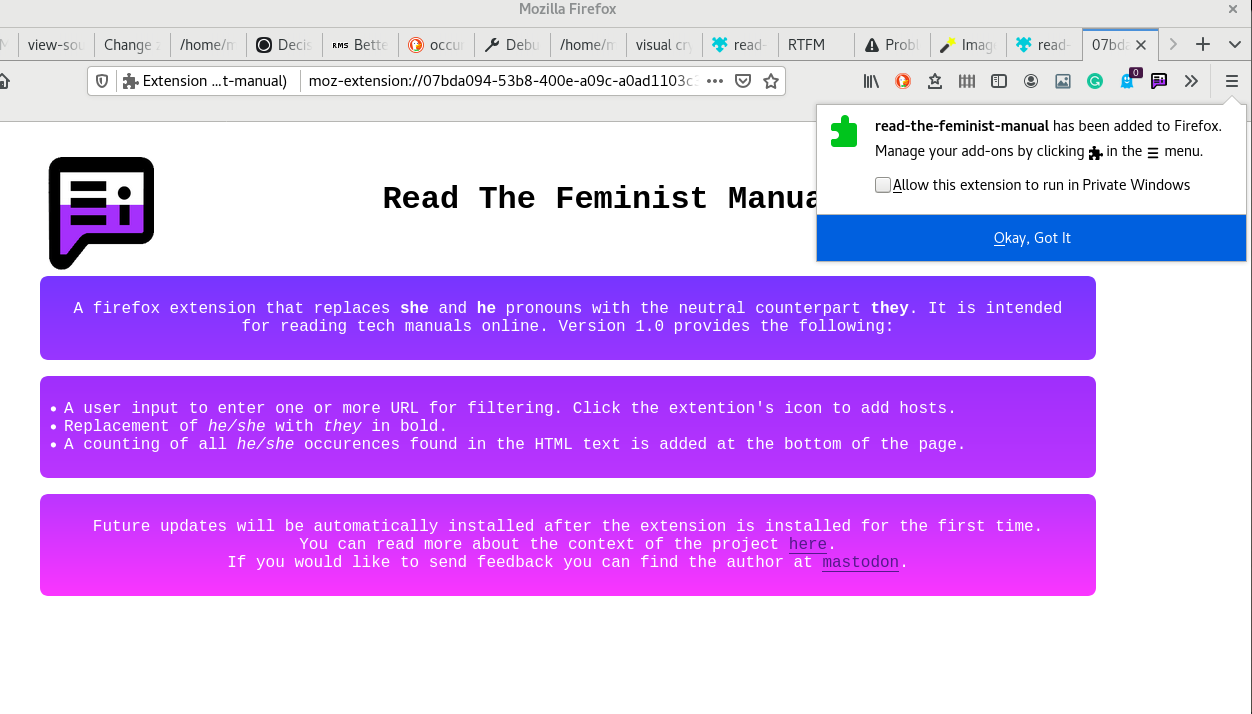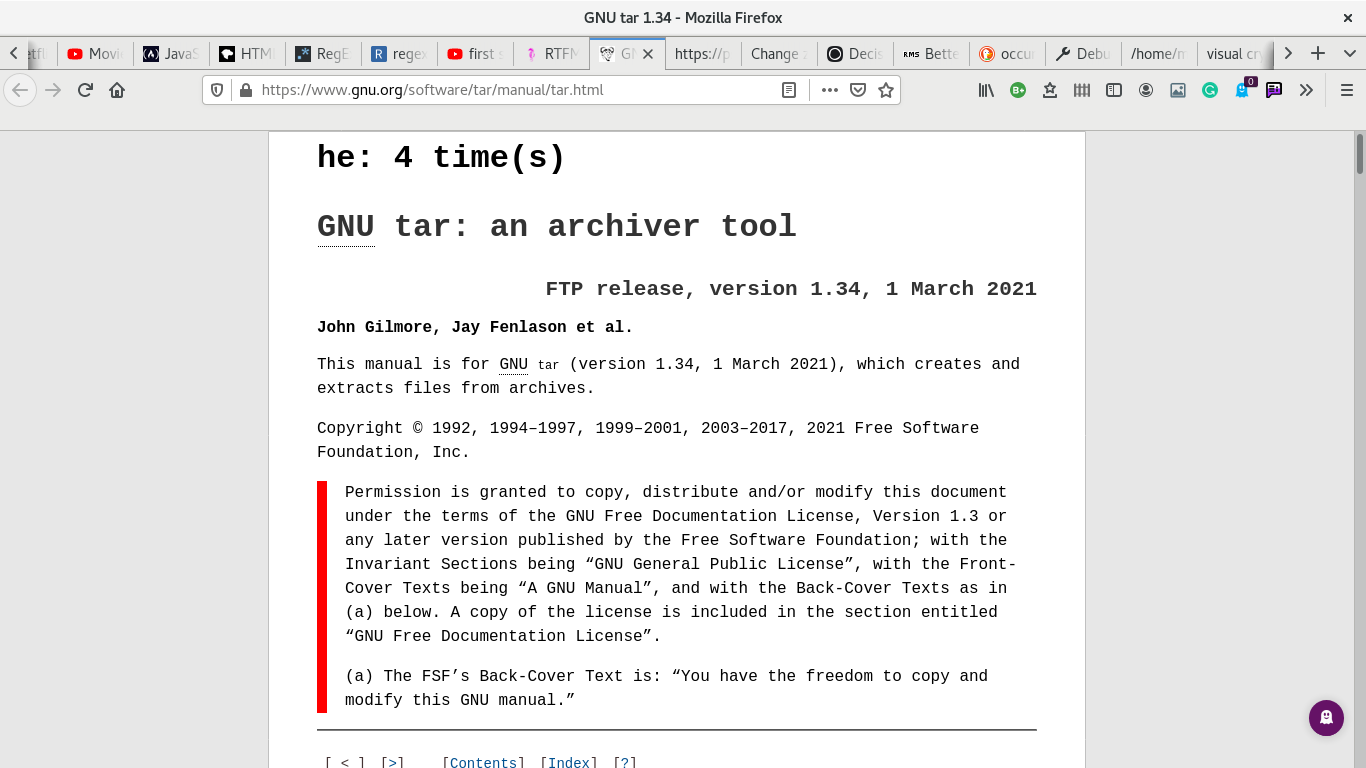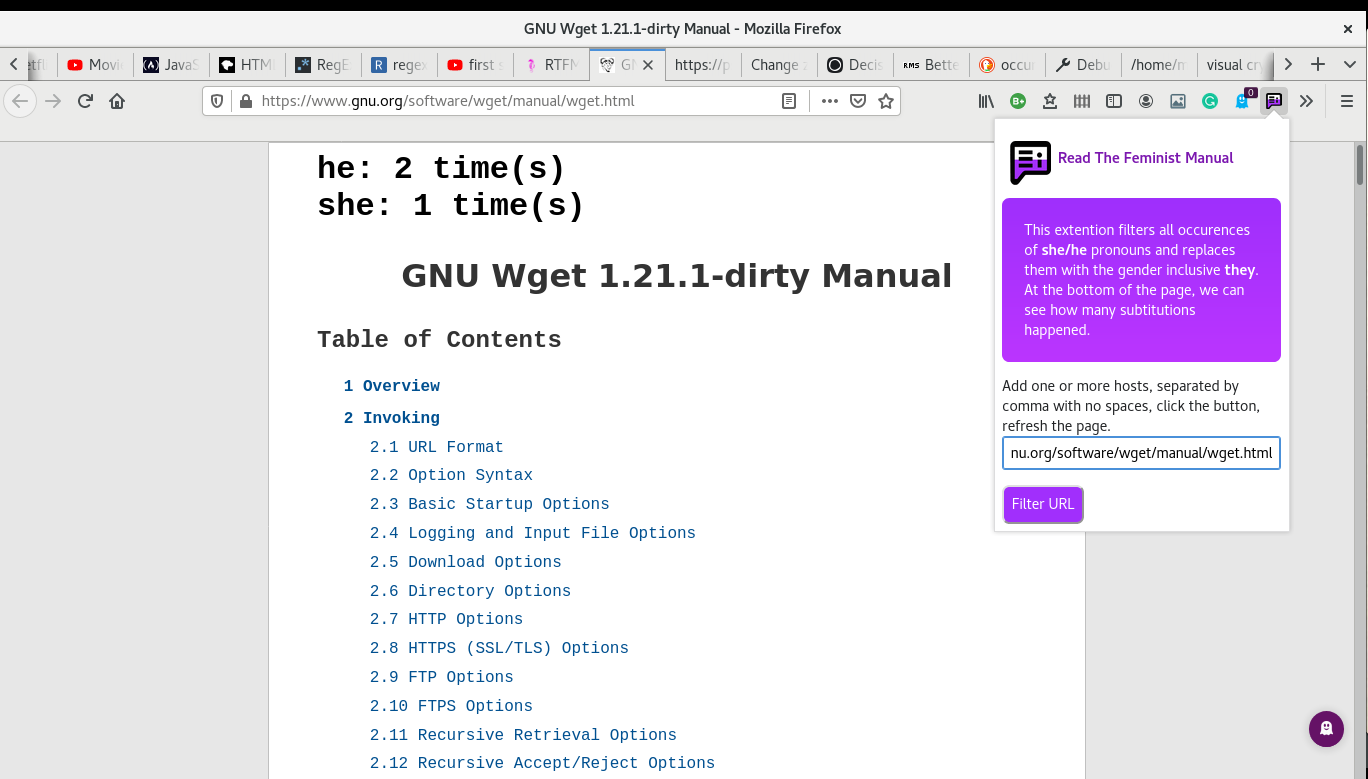Read the Feminist Manual



Mara Karagianni
-
The project Read the Feminist Manual is a re-appropriation of RTFM (Read the Fucking Manual) and addresses gender discrimination in the Free and Open Source Software (FOSS) communities and the lack of support in accommodating marginalized voices. It started in the context of Excavations, an online governance research organized by the Media Enterprise Design Lab of Boulder University of Colorado.
Background
Software and hardware manuals often assume the programmer/engineer is a he. In the case of the GNU gettext, this goes even further, and the introduction discloses that throughout the whole manual, the programmer is pronounced as he, and the translator as she. Informing the reader, that this choice was not meant to be discriminating but only a convenience, fails to clear their narrow point of view. Especially when we read that a patch contribution to fix this discrimination was rejected on the basis that the GNU Kind Communication Guidelines don't mandate gender-neutral speak in documentation. If we dig further, Richard Stallman, one of the founders of the Free Software movement, refuses to use people's preferred pronouns, to the point of dismissing the pronoun they as grammatically wrong and coming up with his own random rules for new pronouns. When we cannot have a say in the decision-making of these communities with regards to language etiquette, gender inclusivity and other forms of discrimination, we can at least circumvent them on another level.
Addon
A Firefox addon that replaces she and he pronouns with the neutral counterpart they, does just this by filtering webpage content. It is an experimental addon, and can be installed from the Mozilla addons gallery here.
Read the Feminist Manual addon version 1.0 provides the following features:
+ A user input to enter one or more URL for filtering. Click the addon's icon to add hosts.
+ Replacement of he/she with they in bold.
+ A counting of all he/she occurrences found in the HTML text is added at the top of the page.
So far, the addon has been tested with the following GNU manuals:
gnutils, mailutils, gettext, tar, emacs, wget
Zine
Along with the extension, a compilation of general information about feminist servers, the context of the project, and screenshots taken during the research and development of the addon are bundled as a PDF in an A5 zine format available in screen version.
-
The project Read the Feminist Manual is a re-appropriation of RTFM (Read the Fucking Manual)and addresses gender discrimination in the Free and Open Source Software (FOSS) communities and the lack of support in accommodating marginalized voices. It started in the context of Excavations, a online governance research organized by the Media Enterprise Design Lab of Boulder University of Colorado. The output of the research is an experimental addon which replaces gendered pronouns he and she to the neutral pronoun they.
Context and inspiration
Free and Open Source Software (aka FOSS) development happens with code contributions within communities. This code is most often technical, but sometimes is about code of conduct, meaning how members shall engage with the community, and code documentation, meaning how other developers and users can interact with the code. The writing of these manuals often assume the programmer/engineer is a he.
The idea for a feminist tech manual as a re-appropriation to RTFM (Read the Fucking Manual) [note 1] came up when I was looking online the documentation of a free software I was installing. I read this from gettext docs:
In this manual, we use he when speaking of the programmer or maintainer, she when speaking of the translator, and they when speaking of the installers or end users of the translated program.
[note 2]
When I posted about this gender stereotype re-enforcement on mastodon, someone pointed me to a patch that was submitted last September by a contributor in the GNU community, who wished to correct this issue by substituting he, she, his, her with they/their. Incredibly but true, this patch was not accepted by the community. Here are some excerpts of the responses to the patch contributor on GNU mailing list (public and accessible) about the gender usage:
The GNU Kind Communication Guidelines don't mandate gender-neutral speak in documentation. [they] are about communication between people, not about documentation. Therefore there is no need for gender-neutral speak in the GNU gettext documentation.
[...] The patch you suggested requires reader to accept "singular they" which is not commonly used anywhere and is considered an error by many, especially in formal writing.
1) In a specific document or documentation, do we want gender-neutral speak?
2) If we want gender-neutral speak, what is the English grammar element that works best?
Here, it's futile to discuss the second question, since the answer to the first question is already "no".
This last quote was the end of the debate. So the question about introducing gender-neutral speak was finally raised by one of the main contributors, only to reject it with the above reasoning. Just for the records here, one response in favor of the change pointed out:
It (they) is very much on the uprise. So much that it's been chosen as the 'Word of The Year' in 2019 by Merriam Webster, And 'Word of the Decade' by The American Dialect Society.
[see the email thread on the GNU lists note 3]
If we dig further, Richard Stallman, one of the founders of the Free Software movement, refuses to use people's preferred pronouns, to the point of dismissing the pronoun they as grammatically wrong and coming up with his own random rules for new pronouns [note 4].
When we cannot have a say in the decision-making of these communities with regards to language etiquette, gender inclusivity and other forms of discrimination, we can at least circumvent them on another level. A browser addon can do that for the readers without waiting for the gender emancipation of the GNU project and the FOSS in general. But more about this later.
This gender inclusivity issue and how it was backed with arguments of language correctness reminds me of another incident in a Greek hacker space's mailing list 2 years ago. What happened in a nutshell; me and a peer organized a presentation about our autonomous feminist servers, and in the event's promotion we wrote a blurb, where we referred to the server with a female pronoun, while in Greek it is called with a male pronoun. The warriors of the Greek language got furious (la rage!) and a long trolling unfolded.
In both incidents, it is clear that the language correctness is a pretext for refusing to waiver the privilege of the male programmer/hacker. The result though has further implications; these communities tend to be biased and changes of social inclusion are (mostly) not happening.
Feminist Servers
What is a feminist server?
A server can be defined as a computer connected to a network that provides services such as hosting files, websites and online services. Because all online resources are hosted on servers, they constitute a base for the internet as we know it. All servers are ruled by different terms of service, governance models and national legislation in relation to privacy and access to data by third actor parties (or "trackers") and are dependent on a variety of business models. This somewhat technical definition can obscure the possibilities for understanding the political aspect behind the setting up and management of a server. [Sophie Toupin, Alexandra Hache note 5]
My safe communities of feminist servers, organized by women identified, trans and queer persons. The last couple of years, I've been part of two feminist autonomous collectives running two servers with some practical tools for our projects (gitlab, nextcloud, wiki, archiving, and recently peertube) [note 6]. I learned a ton by having a server as a playground to experiment with new tasks (software installations, backups, migrations), I acquired and built new tools, and have shared my knowledge within a space of mutual respect. I wouldn't have gone thus far without this supportive community.
From my experience and other feminist tech peers, extensive documentation, be able to ask any question without being frowned upon by competitive peers, without dealing with sexist discourse are some very important factors. These attitudes and solidarity inspire engagement from a diversity of identities, and challenges the dominant FOSS monoculture.
A list of feminist servers
[see more info about each server in cheat-sheet note 7]
1 Alive projects
1.1 Anarchaserver
1.2 La Bekka
1.3 Cl4ndestina
1.4 CódigoSur
1.5 Fuxico + Feminist Pirate Box
1.6 MaadiX
1.7 Matriar.cat
1.8 Systerserver
1.9 Vedetas
1.10 1984
1.11 Diebin
2 Closed projects
2.1 Kefir.red
Support/Resources
Although cyberfeminists have done a lot to put forward their priorities as a movement to funders, it can be argued that internet freedom funders remain unconvinced of the centrality of gender issues and only see it as an add-on or a subset of the sector. [Ledys Sanjuan Mejia note 8]
Feminist internet infrastructures need more support and funding to grow their networks of solidarity. Resources that come with strings attached, such as heavy reporting with risks of privacy concerns, co-opting of feminist tech by Big Tech, pressure on adopting the funders' agenda and so on are issues to consider by tech/cyber feminists, who often come from anti-capitalist and anarchist backgrounds and prefer to stay true to their principles than having access to a larger stream of resources.
RTFM add-on
A Firefox addon that replaces she and he pronouns with the neutral counterpart they, by filtering webpage content, is under development and released as an experimental extension. It can be installed from the Mozilla addons gallery: https://addons.mozilla.org/addon/read-the-feminist-manual/
Read the Feminist Manual version 1.0 provides the following features:
+ A user input to enter one or more URL for filtering. Click the addon's icon to add hosts.
+ Replacement of he/she with they in bold.
+ A counting of all he/she occurrences found in the HTML text is added at the top of the page.
So far, the addon has been tested with the following GNU manuals:
gnutils, mailutils, gettext, tar, emacs, wget
Future versions will include users' options on how to display the pronouns and the counting of existing gendered pronouns. Also, an option to print the filtered content into a PDF would be also added in a future release.
References / Notes:
1. https://en.wikipedia.org/wiki/RTFM
2. https://www.gnu.org/software/gettext/
3. https://lists.gnu.org/archive/html/bug-gettext/2020-09/msg00012.html
4. https://stallman.org/articles/genderless-pronouns.html
5. https://giswatch.org/en/internet-rights/feminist-autonomous-infrastructures
7. https://alexandria.anarchaserver.org/index.php/You_can_check_some_of_their_services_in_this_section